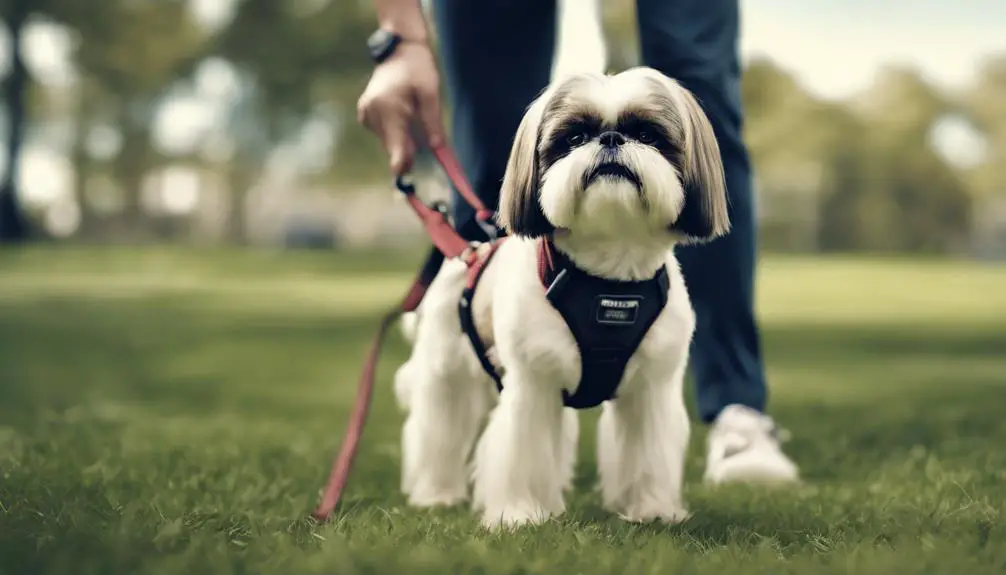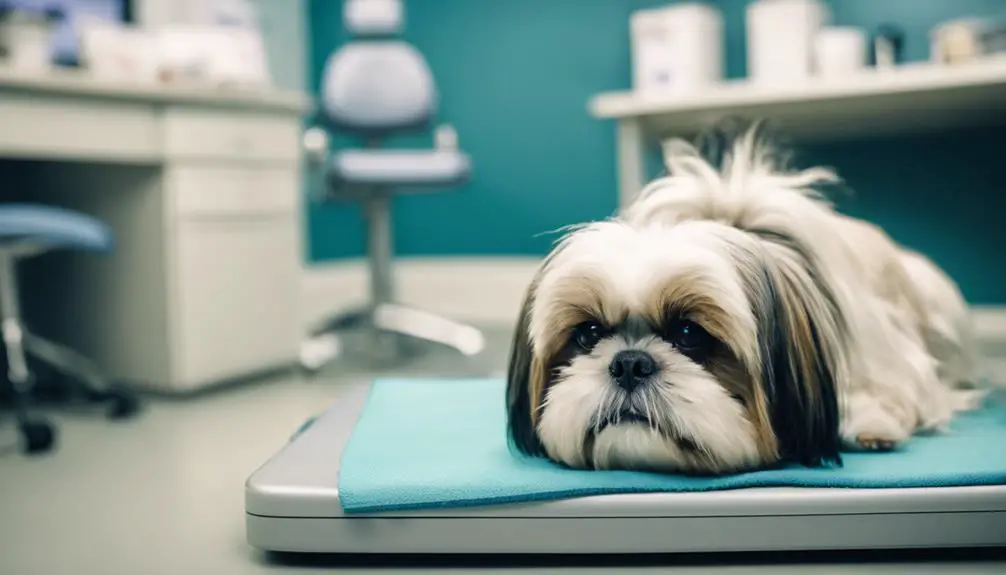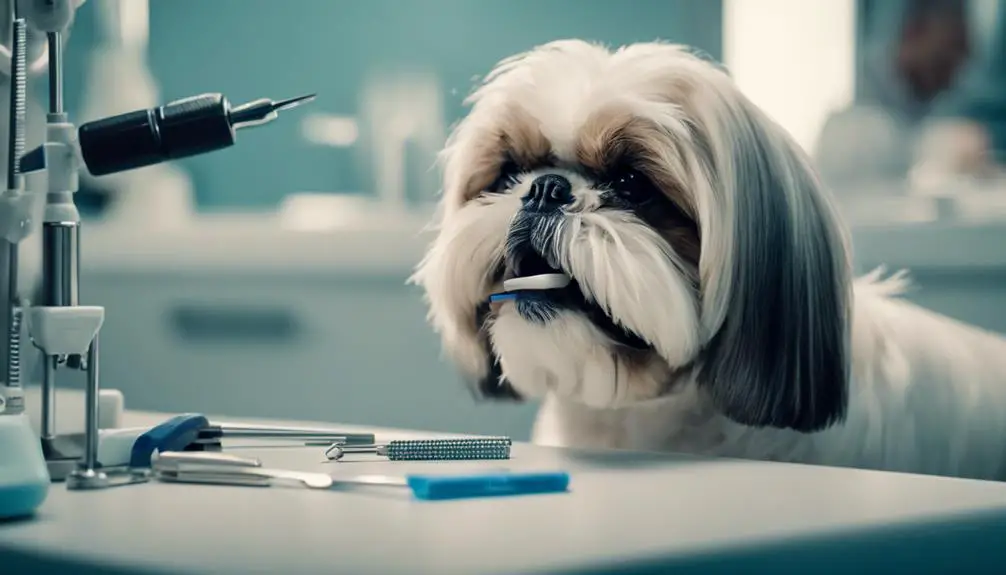As a Shih Tzu owner, you're likely aware of their charm and affectionate nature, but you should also be mindful of their susceptibility to certain health issues. Among the most important are Brachycephalic Airway Syndrome, Hip Dysplasia, and Progressive Retinal Atrophy, each potentially impacting your dog's quality of life significantly. While genetics play a role, there are proactive measures you can take to mitigate these risks. Regular veterinary check-ups, tailored exercise routines, and specific dietary choices are vital. But, how exactly do these strategies work in preventing such severe conditions? Let's explore the intricacies of these preventative measures to ensure your furry friend remains healthy and happy.
Brachycephalic Airway Syndrome

Shih Tzus often suffer from Brachycephalic Airway Syndrome due to their short noses and flat faces. This condition stems from the unique anatomy of their skulls, which leads to narrowed nostrils, elongated soft palates, and sometimes everted laryngeal saccules. Collectively, these traits can obstruct airflow, making it difficult for your Shih Tzu to breathe normally.
You'll notice your pet might snort or snore, showing signs of respiratory distress especially during exercise or hot weather. These symptoms shouldn't be dismissed as merely quirky traits of the breed; they can escalate to serious health issues like hypoxia, where tissues aren't getting enough oxygen, or even collapse if left unmanaged.
To mitigate these risks, keep your Shih Tzu at a healthy weight; obesity exacerbates breathing difficulties. Avoid stressful or overly strenuous activities, particularly in warm climates. Also, be vigilant about monitoring their breathing and seek veterinary advice at the first sign of respiratory distress.
In some cases, vets might recommend surgical intervention to widen the nostrils or shorten the soft palate, improving airflow and enhancing your pet's quality of life. Remember, proactive care can make a significant difference in managing this syndrome effectively.
Hip Dysplasia in Shih Tzus

Another significant health issue you need to be aware of in Shih Tzus is hip dysplasia, a hereditary condition marked by an abnormal formation of the hip joint. This disorder can lead to pain, lameness, and eventually arthritis in your pet. It's important to understand that while hip dysplasia is typically associated with larger breeds, small dogs like Shih Tzus aren't immune.
Early detection is key. Watch for signs like difficulty standing up, reluctance to jump or climb stairs, and a noticeable decrease in activity. If you notice these symptoms, it's vital to consult your veterinarian. They might recommend X-rays to confirm the diagnosis and assess the severity of the condition.
Prevention plays a significant role. Ensuring your Shih Tzu maintains a healthy weight can reduce the stress on their hips. Proper nutrition is also crucial; diets formulated for joint health can provide the necessary nutrients to support hip function.
Regular, moderate exercise helps strengthen the muscles around the hip joints, providing better support and reducing the risk of injury.
Progressive Retinal Atrophy

Progressive Retinal Atrophy gradually deteriorates the retina, leading to eventual blindness in Shih Tzus. This genetic disorder affects the photoreceptor cells in the eyes, which capture light and allow your dog to see.
Initially, you might notice your Shih Tzu struggling with night vision. This difficulty can progress to dim light conditions and eventually day blindness.
Diagnosis involves a thorough examination by a veterinary ophthalmologist, who'll likely perform an electroretinography to assess the retina's response to light.
Unfortunately, there's no cure for Progressive Retinal Atrophy, and the condition is irreversible. However, early detection can help you manage the situation and prepare for your pet's needs as their vision declines.
To mitigate this risk, make sure your Shih Tzu comes from a reputable breeder who uses genetic testing to screen for this condition. Regular check-ups with a vet can catch early signs, allowing for adjustments in your dog's environment to ensure safety and quality of life.
Adding antioxidants to their diet, like Vitamin E and C, might also support retinal health, although it won't prevent the progression of the disease. Always consult with your vet about the best care practices for your Shih Tzu's eye health.
Intervertebral Disk Disease

Many Shih Tzus are susceptible to Intervertebral Disk Disease, a condition where the cushioning disks between the vertebrae either bulge or burst, causing pain, nerve damage, and possibly paralysis. This ailment stems from the degeneration of the spinal disks, which can lead to them slipping out of place. Typically, the mid-back area is most affected, but any part of the spine can suffer from this disorder.
You should be on the lookout for signs of discomfort in your Shih Tzu, including an unwillingness to jump, pain reactions when being picked up, a hunched back, or dragging of the hind legs. Early detection is essential for managing this condition effectively.
Prevention focuses on maintaining a healthy weight for your Shih Tzu, as excess body weight puts additional stress on the spine. Regular, moderate exercise can help keep their back muscles strong and properly support the spine. Diet also plays a role; make sure they're getting the right nutrients to maintain disk and joint health.
In cases where prevention isn't enough, veterinary interventions such as anti-inflammatory medications, pain relievers, or even surgery might be necessary. It's important to follow a vet's guidance closely to manage symptoms and improve quality of life.
Dental Health Challenges

Shih Tzus often face significant dental health challenges, including a high risk of periodontal disease due to their small mouths and overcrowded teeth. You'll find that these conditions create a breeding ground for plaque and tartar buildup, which can progress to gingivitis and periodontitis if not promptly addressed.
To prevent these serious issues, you must maintain diligent oral hygiene for your Shih Tzu. Start by brushing their teeth daily using a toothbrush and toothpaste specifically designed for dogs. This routine helps remove plaque before it hardens into tartar, greatly reducing the risk of gum disease.
Additionally, consider incorporating dental chews and toys that promote oral health. These products aren't only enjoyable for your pet but also assist in cleaning the teeth mechanically as they chew. However, it's important to select items appropriate for your Shih Tzu's size to avoid any choking hazards.
Regular veterinary check-ups, including professional dental cleanings, are essential. Your vet can thoroughly clean areas you're unable to reach at home and can detect early signs of dental issues before they escalate into more severe conditions.
Conclusion
To sum up, safeguarding your Shih Tzu's health involves proactive measures against common issues like Brachycephalic Airway Syndrome, Hip Dysplasia, Progressive Retinal Atrophy, Intervertebral Disk Disease, and Dental Health Challenges.
You'll need to manage their diet, maintain regular exercise, monitor breathing closely, and uphold stringent dental hygiene. Don't hesitate to consult your vet for guidance and interventions.
Your dedication to these practices is vital in preserving your Shih Tzu's health and enhancing their quality of life.


